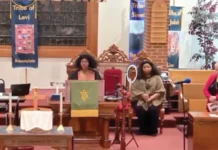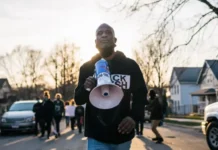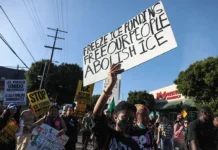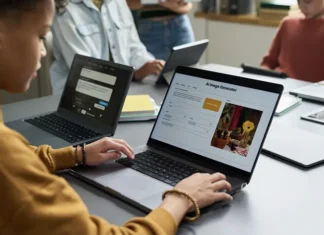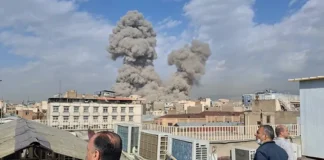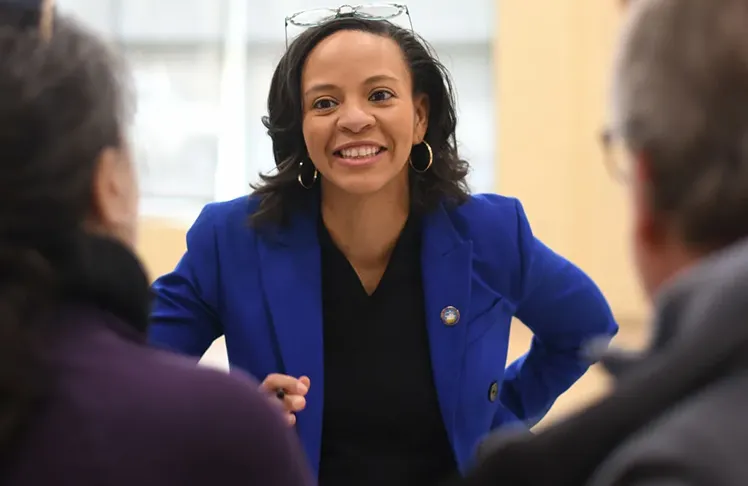
Virginia has witnessed remarkable political achievements for Black women, who have made significant strides in various down-ballot races. These victories are not just numerical wins but symbolize deeper democratic engagement and empowerment. In 2023, Virginia State Senator Jennifer McClellan was overwhelmingly elected to Congress, becoming the state’s first Black woman to achieve this feat. And Democratic Delegate Charniele Herring became the first Black woman to serve as Virginia House Majority Leader. Also, this year, the city of Alexandria celebrated the election of Alyia Gaskins as its first Black female mayor.
Unerased spoke to Krysta Jones, co-convener of the Black Women’s Roundtable Virginia (BWR VA), for her insight on Virginia’s transformative fight for democracy. Also the founder of Vote Lead Impact, Jones is at the forefront of training and leadership development of Black women throughout the state.
Leaders like Jones ignite, inspire, and implement proactive change. They find ways to adapt quickly to get things done on the ground that have a far reaching impact on the daily issues that Black women face at home, at work, and in the community.
As we approach what could be the most critical presidential election of our times, it is crucial to answer their call to engage, act, and vote up and down the ballot. With their focus and fiercity, they demonstrate that the success of democracy relies on collective efforts and it begins on the local level.
Unerased: What are the origins of Vote Lead Impact (VLI) and how it has evolved over the years, particularly in response to recent political and social movements?
Krysta Jones: I founded VLI (formerly Virginia Leadership Institute), in 2006. BWR VA partners with VLI, which has evolved to support the growing need for representation and progressive policies. In 2020, the backlash against divisive national politics sparked a movement where more marginalized individuals felt compelled to run for office. This effect was magnified by the collective trauma and subsequent activism following George Floyd’s murder. We organized and got to work to meet the demands for justice.
U: Explain the significance of down-ballot races.
KJ: Down-ballot races, particularly at the local level, are where significant strides can be made. Local government affects daily lives directly through decisions on housing, education, and community services. It’s also where Black women can make substantial changes quickly due to shorter decision cycles and more direct community interaction. In Virginia, the number of Black women serving in the General Assembly has recently doubled. We have also seen more Black women make an impact at the local level by being elected as chair of the board of supervisors, county councils, school boards, mayors and other constitutional officers.
We can’t overemphasize the power of having Black women in down ballot seats. As Black women advocates, we work daily to transform our communities. Just as our non- Black colleagues have formed relationships and created networks with elected officials who look like them, we can do that as well. That goes beyond representation. It translates into power and influence that we are able to use to make tangible impacts in our neighborhoods.
U: What organizational strategies have led to the success of Black women in Virginia’s elections?
KJ: We facilitate discussions, training, and strategy sessions through non-partisan platforms like the BWR VA. While we don’t endorse candidates, we create spaces for Black women to learn from each other and prepare for electoral challenges. That looks like Black women electeds attending our Zoom organizing calls on Black women’s economic mobility and strategizing about solutions that change lives. That looks like getting real feedback on legislative gun safety strategies in Virginia from Black women electeds, because as we know, the firearm murder rate for Black people is 8.4 times higher than the rate for white people. That looks like Black women that are in office training other Black women to step up and lead.
U: How do you leverage different platforms and community engagement to not only raise awareness but also sustain support for Black women leaders once elected?
KJ: We use social media and live events to educate and engage our community on critical issues. These platforms allow us to bring fresh voices to the forefront, ensuring our message resonates widely and inclusively. As a part of the National Coalition of 100 Black Women, Northern Virginia Chapter, we sent thank you letters to several Black women elected and community leaders on whose shoulders we stand. These simple notes led to deeper conversations allowing us to learn from their wisdom. One Black female local elected official noted that we’ve worked so hard to get Black women elected, we now have to keep them there. It’s not just the electoral wins we have to fight for, it’s what happens between the elections. Some people are working to discredit us and make it uncomfortable for us to stay in the position. Our challenge now is to use that influence and power to create the support our Black women leaders need.
U: What are some of the key issues that Black women in Virginia see as important in the current political climate?
KJ: Economic stability, healthcare, and education consistently top the list of concerns. Additionally, the preservation of democracy has become increasingly significant, especially in light of recent national events that have threatened to undermine democratic processes.
U: With the 2024 Presidential election looming, how do you feel about the upcoming electoral challenges?
KJ: There’s optimism but we can’t take any progress for granted. Continuous electoral cycles in Virginia mean we are always in campaign mode, striving to maintain momentum and adapt strategies.
Tracy Chiles McGhee is a writer and constituency engagement advisor for Unerased | Black Women Speak.



